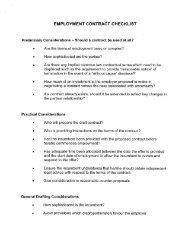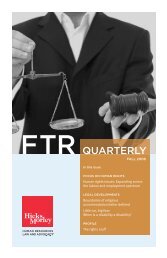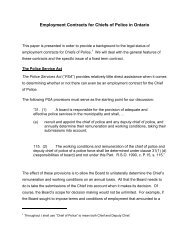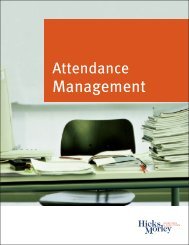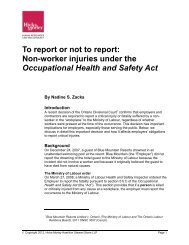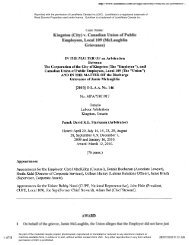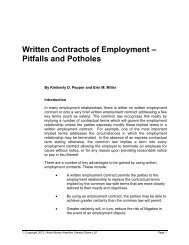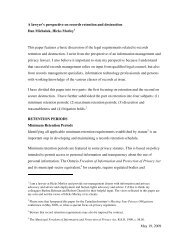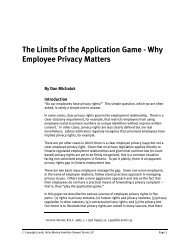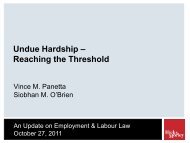Unjust Dismissal: Being Prepared from Start to Finish - Hicks Morley
Unjust Dismissal: Being Prepared from Start to Finish - Hicks Morley
Unjust Dismissal: Being Prepared from Start to Finish - Hicks Morley
Create successful ePaper yourself
Turn your PDF publications into a flip-book with our unique Google optimized e-Paper software.
<strong>Unjust</strong> <strong>Dismissal</strong>: <strong>Being</strong> <strong>Prepared</strong><br />
<strong>from</strong> <strong>Start</strong> <strong>to</strong> <strong>Finish</strong><br />
June 5, 2013<br />
<strong>Unjust</strong> <strong>Dismissal</strong>: <strong>Being</strong> <strong>Prepared</strong> <strong>from</strong> <strong>Start</strong> <strong>to</strong> <strong>Finish</strong><br />
June 5, 2013
<strong>Unjust</strong> <strong>Dismissal</strong>: <strong>Being</strong> <strong>Prepared</strong> <strong>from</strong><br />
<strong>Start</strong> <strong>to</strong> <strong>Finish</strong><br />
Daniel B. Fogel<br />
Frank Cesario<br />
Elisha C. Jamieson<br />
<strong>Unjust</strong> <strong>Dismissal</strong>: <strong>Being</strong> <strong>Prepared</strong> <strong>from</strong> <strong>Start</strong> <strong>to</strong> <strong>Finish</strong><br />
June 5, 2013
Overview<br />
• Process & Strategy<br />
• Overlapping Forums<br />
• Remedies<br />
• Professional and Ethical Issues<br />
<strong>Unjust</strong> <strong>Dismissal</strong>: <strong>Being</strong> <strong>Prepared</strong> <strong>from</strong> <strong>Start</strong> <strong>to</strong> <strong>Finish</strong><br />
June 5, 2013
Process & Strategy<br />
• The Complaint – Canada Labour Code ss. 240 and 241<br />
• non-unionized employee with at least 12 consecutive<br />
months of continuous employment may make a<br />
complaint if the employee “considers the dismissal <strong>to</strong> be<br />
unjust”<br />
• complaint shall be made within 90 days of dismissal<br />
• inspec<strong>to</strong>r may request employer “<strong>to</strong> provide a written<br />
statement giving the reasons for the dismissal” (15 days<br />
<strong>to</strong> respond)<br />
<strong>Unjust</strong> <strong>Dismissal</strong>: <strong>Being</strong> <strong>Prepared</strong> <strong>from</strong> <strong>Start</strong> <strong>to</strong> <strong>Finish</strong><br />
June 5, 2013
Process & Strategy<br />
• Preparing the response [s. 241(1)]<br />
• Adjudica<strong>to</strong>rs do not permit amendments<br />
• Rogers Cantel Inc. v. Meilleur (1992): “The general<br />
rule… is that the responding employer is limited at<br />
the hearing… <strong>to</strong> those matters raised in its letter of<br />
response <strong>to</strong> the inspec<strong>to</strong>r <strong>from</strong> Labour Canada ...”<br />
• Exceptions include:<br />
• where the employer seeks <strong>to</strong> expand upon the<br />
reasons initially given, so long as those expanded<br />
reasons relate <strong>to</strong> those initially proffered<br />
<strong>Unjust</strong> <strong>Dismissal</strong>: <strong>Being</strong> <strong>Prepared</strong> <strong>from</strong> <strong>Start</strong> <strong>to</strong> <strong>Finish</strong><br />
June 5, 2013
Process & Strategy<br />
• Preparing the response:<br />
• Strategic Considerations<br />
• Parties are “stuck” with the original response<br />
• It is essential that all incidents that you intend <strong>to</strong> rely<br />
on are stated in the response<br />
• Must clearly state the reason for cause and be<br />
factually accurate<br />
• The less detail the better<br />
<strong>Unjust</strong> <strong>Dismissal</strong>: <strong>Being</strong> <strong>Prepared</strong> <strong>from</strong> <strong>Start</strong> <strong>to</strong> <strong>Finish</strong><br />
June 5, 2013
Process & Strategy<br />
• Preliminary Objections:<br />
• The position is redundant: section 242(3.1)(a):<br />
• Limitations on complaints – No complaint shall be<br />
considered by an adjudica<strong>to</strong>r… where… that person<br />
has been laid off because… of the discontinuance of<br />
a function<br />
• Canadian Imperial Bank of Commerce v. Muthiah<br />
(2011)<br />
<strong>Unjust</strong> <strong>Dismissal</strong>: <strong>Being</strong> <strong>Prepared</strong> <strong>from</strong> <strong>Start</strong> <strong>to</strong> <strong>Finish</strong><br />
June 5, 2013
Process & Strategy<br />
• Preliminary Objections:<br />
• The employee is a manager or employed in a<br />
confidential capacity<br />
• Section 167(3): Division XIV does not apply <strong>to</strong> or in<br />
respect of employees who are managers<br />
• The employee has been employed for less than 12<br />
consecutive months<br />
<strong>Unjust</strong> <strong>Dismissal</strong>: <strong>Being</strong> <strong>Prepared</strong> <strong>from</strong> <strong>Start</strong> <strong>to</strong> <strong>Finish</strong><br />
June 5, 2013
Process & Strategy<br />
• What if you do not have cause for dismissal<br />
• In order <strong>to</strong> respond, you must allege cause<br />
• However, recent cases suggest an alternate approach:<br />
• If the contract defines a method of termination, and<br />
provides greater notice than under the Code, the<br />
adjudica<strong>to</strong>r is without jurisdiction<br />
<strong>Unjust</strong> <strong>Dismissal</strong>: <strong>Being</strong> <strong>Prepared</strong> <strong>from</strong> <strong>Start</strong> <strong>to</strong> <strong>Finish</strong><br />
June 5, 2013
Process & Strategy<br />
• What if you do not have cause for dismissal<br />
• Paul v. The National Centre for First Nations<br />
Governance (2012)<br />
• “In cases where there is a contract of employment<br />
that is not considered unconscionable, adjudica<strong>to</strong>rs<br />
have often concluded that they have no<br />
jurisdiction if the contract defines a method of<br />
terminating. Although this approach is not universal,<br />
I am of the view that in the circumstances of this case<br />
I do not have jurisdiction.”<br />
<strong>Unjust</strong> <strong>Dismissal</strong>: <strong>Being</strong> <strong>Prepared</strong> <strong>from</strong> <strong>Start</strong> <strong>to</strong> <strong>Finish</strong><br />
June 5, 2013
Overlapping Forums<br />
• CHRC Claim vs. CLC Claim<br />
• Canada Labour Code, s. 242(3.1)(b):<br />
• Limitation on complaints - No complaint shall be<br />
considered by an adjudica<strong>to</strong>r under subsection (3) in<br />
respect of a person where a procedure for redress<br />
has been provided elsewhere in or under this or any<br />
other Act of Parliament.<br />
<strong>Unjust</strong> <strong>Dismissal</strong>: <strong>Being</strong> <strong>Prepared</strong> <strong>from</strong> <strong>Start</strong> <strong>to</strong> <strong>Finish</strong><br />
June 5, 2013
Overlapping Forums<br />
• CHRC Claim vs. CLC Claim<br />
• Canadian Human Rights Act, s. 44(2)<br />
If, on receipt of a report referred <strong>to</strong> in subsection (1), the<br />
Commission is satisfied<br />
(a) that the complainant ought <strong>to</strong> exhaust grievance or review<br />
procedures otherwise reasonably available, or<br />
(b) that the complaint could more appropriately be dealt with,<br />
initially or completely, by means of a procedure provided for<br />
under an Act of Parliament other than this Act,<br />
it shall refer the complainant <strong>to</strong> the appropriate authority.<br />
<strong>Unjust</strong> <strong>Dismissal</strong>: <strong>Being</strong> <strong>Prepared</strong> <strong>from</strong> <strong>Start</strong> <strong>to</strong> <strong>Finish</strong><br />
June 5, 2013
Overlapping Forums<br />
• CHRC Claim vs. CLC Claim<br />
• MacFarlane v. Day & Ross Inc. (2010)<br />
• an adjudica<strong>to</strong>r must decline <strong>to</strong> hear an unjust<br />
dismissal complaint if another substantially similar<br />
complaint has been filed under the Canadian Human<br />
Rights Act, or<br />
• where no complaint has been submitted under that<br />
Act, if the Canada Labour Code complaint raises<br />
human rights issues which could reasonably<br />
constitute a basis for a substantially similar complaint<br />
under the Canadian Human Rights Act.<br />
<strong>Unjust</strong> <strong>Dismissal</strong>: <strong>Being</strong> <strong>Prepared</strong> <strong>from</strong> <strong>Start</strong> <strong>to</strong> <strong>Finish</strong><br />
June 5, 2013
Overlapping Forums<br />
• CHRC Claim vs. CLC Claim<br />
• MacFarlane v. Day & Ross Inc. (2010)<br />
• the Canadian Human Rights Commission could refer<br />
the complaint <strong>to</strong> the adjudica<strong>to</strong>r if it is satisfied that it<br />
could be more appropriately dealt with in the context<br />
of an unjust dismissal hearing.<br />
• In such an event, the adjudica<strong>to</strong>r would have the<br />
authority <strong>to</strong> hear and decide the human rights<br />
allegations <strong>to</strong> the extent that they relate <strong>to</strong> the unjust<br />
dismissal which he is appointed <strong>to</strong> adjudicate.<br />
<strong>Unjust</strong> <strong>Dismissal</strong>: <strong>Being</strong> <strong>Prepared</strong> <strong>from</strong> <strong>Start</strong> <strong>to</strong> <strong>Finish</strong><br />
June 5, 2013
Overlapping Forums<br />
• Civil Claim vs. CLC Claim<br />
• Ng v. Bank of Montreal (2010)<br />
• In this case, the adjudica<strong>to</strong>r did not decide the unjust<br />
dismissal complaint because it was withdrawn<br />
• “Absent a prior final determination on the merits, I see<br />
no basis <strong>to</strong> apply the doctrine of abuse of process,<br />
especially in light of section 246(1) of the Canada<br />
Labour Code which provides that ‘no civil remedy of<br />
an employee against his employer is suspended or<br />
affected by sections 240 <strong>to</strong> 245’.”<br />
<strong>Unjust</strong> <strong>Dismissal</strong>: <strong>Being</strong> <strong>Prepared</strong> <strong>from</strong> <strong>Start</strong> <strong>to</strong> <strong>Finish</strong><br />
June 5, 2013
Overlapping Forums<br />
• Civil Claim vs. CLC Claim<br />
• Ng v. Bank of Montreal (2010)<br />
• “Had I not found that Ms. Ng's claim was statutebarred,<br />
I would not have been inclined <strong>to</strong> exercise my<br />
discretion <strong>to</strong> stay her action.”<br />
• Unclear whether Court’s refusal was premised on<br />
withdrawal of unjust dismissal complaint or because<br />
the two proceedings could be pursued concurrently<br />
<strong>Unjust</strong> <strong>Dismissal</strong>: <strong>Being</strong> <strong>Prepared</strong> <strong>from</strong> <strong>Start</strong> <strong>to</strong> <strong>Finish</strong><br />
June 5, 2013
Remedies<br />
• Section 242(4):<br />
(4) Where an adjudica<strong>to</strong>r decides pursuant <strong>to</strong> subsection (3) that a<br />
person has been unjustly dismissed, the adjudica<strong>to</strong>r may, by order,<br />
require the employer who dismissed the person <strong>to</strong><br />
(a) pay the person compensation not exceeding the amount of<br />
money that is equivalent <strong>to</strong> the remuneration that would, but for<br />
the dismissal, have been paid by the employer <strong>to</strong> the person;<br />
(b) reinstate the person in his employ; and<br />
(c) do any other like thing that it is equitable <strong>to</strong> require the<br />
employer <strong>to</strong> do in order <strong>to</strong> remedy or counteract any<br />
consequence of the dismissal.<br />
<strong>Unjust</strong> <strong>Dismissal</strong>: <strong>Being</strong> <strong>Prepared</strong> <strong>from</strong> <strong>Start</strong> <strong>to</strong> <strong>Finish</strong><br />
June 5, 2013
Remedies<br />
• Reinstatement: s. 242(b)<br />
• Sprint Canada v. Lancaster (2004)<br />
• the purpose of the Code is <strong>to</strong> provide employees with<br />
similar protection against unjust dismissal as would<br />
be available under a collective agreement<br />
• reinstatement is appropriate in all but the most<br />
exceptional circumstances<br />
• Sheikholeslami v. A<strong>to</strong>mic Energy of Canada Ltd. (1998)<br />
• Reinstatement inappropriate where: (a) an absence<br />
of trust; and (b) the relationship is no longer viable<br />
<strong>Unjust</strong> <strong>Dismissal</strong>: <strong>Being</strong> <strong>Prepared</strong> <strong>from</strong> <strong>Start</strong> <strong>to</strong> <strong>Finish</strong><br />
June 5, 2013
Remedies<br />
• Monetary Orders: s. 242(a)<br />
• Wolf Lake First Nation v. Young (1997)<br />
• Designed <strong>to</strong> fully compensate an employee who is unjustly<br />
dismissed.<br />
• Limiting the amount of damages for unjust dismissal <strong>to</strong> the<br />
amount of severance pay or on the basis of the common law is<br />
an error.<br />
• Ross v. Rosedale Transport Ltd. (2003)<br />
• Employee is entitled <strong>to</strong> be compensated for any and all losses of<br />
wages and other employee benefits <strong>from</strong> the date of termination<br />
until the date of the award, whether or not reinstatement is<br />
ordered.<br />
<strong>Unjust</strong> <strong>Dismissal</strong>: <strong>Being</strong> <strong>Prepared</strong> <strong>from</strong> <strong>Start</strong> <strong>to</strong> <strong>Finish</strong><br />
June 5, 2013
Remedies<br />
• “Make Whole” Orders: s. 242(c)<br />
• Lockwood v. B & D Walter Trucking Ltd. (2010)<br />
• philosophy is <strong>to</strong> make the claimant whole by compensating for<br />
any real losses that are a result of the dismissal<br />
• Can include damages for:<br />
• Emotional distress<br />
• Personal Dignity and Mitigation expenses (incl. cost of flights)<br />
• Legal costs and moral damages<br />
• Award of legal costs against employee is permitted only in<br />
extraordinary circumstances<br />
<strong>Unjust</strong> <strong>Dismissal</strong>: <strong>Being</strong> <strong>Prepared</strong> <strong>from</strong> <strong>Start</strong> <strong>to</strong> <strong>Finish</strong><br />
June 5, 2013
Remedies<br />
• Other Types of Orders<br />
• Potential Issues:<br />
• Can an adjudica<strong>to</strong>r award damages for loss of<br />
earnings and loss of opportunity<br />
• Can an adjudica<strong>to</strong>r order an employer <strong>to</strong> change or<br />
amend a Notice of Termination (Form 33)<br />
<strong>Unjust</strong> <strong>Dismissal</strong>: <strong>Being</strong> <strong>Prepared</strong> <strong>from</strong> <strong>Start</strong> <strong>to</strong> <strong>Finish</strong><br />
June 5, 2013
Professional and Ethical Issues<br />
2.04 - Unrepresented Persons<br />
(14) When a lawyer is dealing on a client’s behalf with an unrepresented<br />
person, the lawyer shall<br />
(a) urge the unrepresented person <strong>to</strong> obtain independent legal<br />
representation,<br />
(b) take care <strong>to</strong> see that the unrepresented person is not proceeding<br />
under the impression that his or her interests will be protected by the<br />
lawyer, and<br />
(c) make clear <strong>to</strong> the unrepresented person that the lawyer is acting<br />
exclusively in the interests of the client and accordingly his or her<br />
comments may be partisan.<br />
<strong>Unjust</strong> <strong>Dismissal</strong>: <strong>Being</strong> <strong>Prepared</strong> <strong>from</strong> <strong>Start</strong> <strong>to</strong> <strong>Finish</strong><br />
June 5, 2013
Professional and Ethical Issues<br />
• Other Rules which may play a role when dealing with<br />
unrepresented persons include:<br />
• Rule 4.01(2)(h) – binding authorities<br />
• Rule 4.01(6) and 6.03(1) – courtesy<br />
• Rule 6.03(2) – agreeing <strong>to</strong> reasonable procedural<br />
requests<br />
• Rule 6.03(5) – communications<br />
<strong>Unjust</strong> <strong>Dismissal</strong>: <strong>Being</strong> <strong>Prepared</strong> <strong>from</strong> <strong>Start</strong> <strong>to</strong> <strong>Finish</strong><br />
June 5, 2013
Professional and Ethical Issues<br />
Rule 2.02: Quality of Service<br />
• Encouraging Compromise or Settlement<br />
• (2) A lawyer shall advise and encourage the client <strong>to</strong> compromise or<br />
settle a dispute whenever it is possible <strong>to</strong> do so on a reasonable basis<br />
and shall discourage the client <strong>from</strong> commencing useless legal<br />
proceedings.<br />
• (3) The lawyer shall consider the use of alternative dispute resolution<br />
(ADR) for every dispute, and, if appropriate, the lawyer shall inform the<br />
client of ADR options and, if so instructed, take steps <strong>to</strong> pursue those<br />
options.<br />
<strong>Unjust</strong> <strong>Dismissal</strong>: <strong>Being</strong> <strong>Prepared</strong> <strong>from</strong> <strong>Start</strong> <strong>to</strong> <strong>Finish</strong><br />
June 5, 2013
<strong>Unjust</strong> <strong>Dismissal</strong>: <strong>Being</strong> <strong>Prepared</strong><br />
<strong>from</strong> <strong>Start</strong> <strong>to</strong> <strong>Finish</strong><br />
June 5, 2013<br />
<strong>Unjust</strong> <strong>Dismissal</strong>: <strong>Being</strong> <strong>Prepared</strong> <strong>from</strong> <strong>Start</strong> <strong>to</strong> <strong>Finish</strong><br />
June 5, 2013



